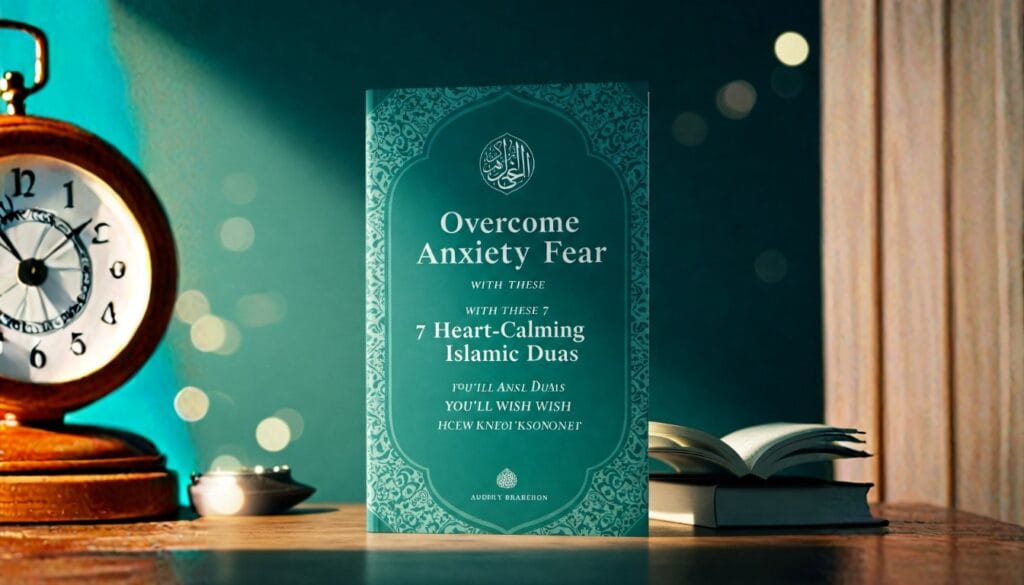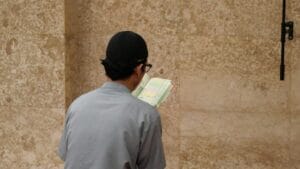In today’s fast-paced world, anxiety and fear have become all-too-common companions for many. The pressures of work, family responsibilities, financial struggles, or even the unpredictability of life can leave us feeling overwhelmed and restless. For Muslims, however, there’s a timeless source of comfort and strength: dua (supplication). Rooted in the Quran and the teachings of the Prophet Muhammad (PBUH), Islamic duas offer a direct connection to Allah (SWT), helping us find peace when our hearts are heavy. This comprehensive guide introduces seven powerful, heart-calming duas that can help you overcome anxiety and fear—supplications so effective, you’ll wish you had discovered them sooner.
These duas are more than just words; they are spiritual remedies that soothe the soul, restore hope, and remind us of Allah’s infinite mercy. Whether you’re facing a fleeting moment of worry or a persistent battle with fear, this article will equip you with practical tools to find tranquility. We’ll explore each dua in depth, provide their meanings and contexts, and offer actionable advice on how to weave them into your daily life. Plus, you’ll find recommended resources, reviews, and insights to enhance your journey toward emotional and spiritual well-being.

Introduction: Why Islamic Duas Are a Lifeline for Anxiety and Fear
Life’s challenges can sometimes feel like storms raging within us. Anxiety might creep in during sleepless nights, while fear can grip us when we face the unknown. Fortunately, Islam offers a profound solution through dua—a way to speak directly to Allah (SWT), the One who controls all affairs. The Quran beautifully states, “Indeed, with the remembrance of Allah, hearts find rest” (Surah Ar-Ra’d 13:28). This verse underscores the transformative power of turning to Allah in times of distress.
The Prophet Muhammad (PBUH) exemplified this practice, teaching us specific duas to recite during moments of emotional turmoil. These supplications are not only acts of worship but also pathways to inner peace. By invoking Allah’s names—like Ar-Rahman (The Most Compassionate) and As-Salaam (The Source of Peace)—we invite His tranquility into our lives. This article unveils seven such duas that target anxiety and fear, offering you a spiritual toolkit to navigate life’s uncertainties.
Here’s what you’ll gain from this guide:
- Seven authentic Islamic duas with their Arabic text, transliteration, and English meanings.
- Insights into how these duas address emotional struggles.
- Practical tips for making duas a habit.
- Curated resources—books, apps, and courses—with prices, reviews, and ratings.
- Stories and advice to inspire trust in Allah’s plan.
Let’s dive into these heart-calming supplications and discover how they can bring peace to your soul.
The Spiritual and Emotional Power of Dua
A Direct Connection to Allah
Dua is often called “the essence of worship” (Tirmidhi), reflecting its central role in a Muslim’s life. The Quran assures us, “And your Lord says, ‘Call upon Me; I will respond to you’” (Surah Ghafir 40:60). This promise is a beacon of hope, especially when anxiety and fear cloud our minds. By making dua, we acknowledge our dependence on Allah, reinforcing tawakkul (trust in His divine plan). The act of supplicating shifts our focus from our worries to Allah’s limitless power, providing immediate comfort.
Read more
Beyond Spirituality: Mental Health Benefits
Reciting duas isn’t just a spiritual exercise—it also supports emotional well-being. Research on mindfulness and prayer shows that repetitive, focused recitation can lower stress hormones like cortisol, reduce anxiety, and enhance resilience. The rhythm of Arabic duas, paired with their deep meanings, creates a meditative effect, calming the mind and heart. For Muslims, this dual benefit—spiritual connection and psychological relief—makes duas an invaluable tool for overcoming fear and worry.
7 Heart-Calming Islamic Duas to Overcome Anxiety and Fear
Below are seven carefully selected duas from the Quran and Hadith, each designed to soothe anxiety and dispel fear. For each, you’ll find the Arabic text, transliteration, English translation, and guidance on when and how to use it.
1. Dua for Relief from Anxiety and Grief
This all-encompassing dua addresses multiple emotional and worldly struggles, making it a go-to supplication for distress.
Arabic:
اللَّهُمَّ إِنِّي أَعُوذُ بِكَ مِنَ الْهَمِّ وَالْحَزَنِ، وَأَعُوذُ بِكَ مِنَ الْعَجْزِ وَالْكَسَلِ، وَأَعُوذُ بِكَ مِنَ الْجُبْنِ وَالْبُخْلِ، وَأَعُوذُ بِكَ مِنْ غَلَبَةِ الدَّيْنِ وَقَهْرِ الرِّجَالِ
Transliteration:
Allahumma inni a’udhu bika minal-hammi wal-huzn, wa a’udhu bika minal-‘ajzi wal-kasal, wa a’udhu bika minal-jubni wal-bukhl, wa a’udhu bika min ghalabatid-dayni wa qahrir-rijal.
Translation:
O Allah, I seek refuge in You from anxiety and sorrow, from weakness and laziness, from cowardice and stinginess, and from being overwhelmed by debt and the oppression of men.
When to Recite:
- During overwhelming moments of stress or sadness.
- As part of your morning and evening adhkar (remembrances).
Significance: Narrated in Sahih Bukhari, this dua was recommended by the Prophet (PBUH) to shield against emotional and material burdens. It’s a holistic plea for protection, addressing both the heart and external challenges.
How It Helps: By seeking refuge from anxiety (hamm) and grief (huzn), you entrust your worries to Allah, easing the mental load and fostering resilience.
2. Dua for Ease and Relief
Short yet profound, this dua asks Allah to transform difficulties into ease—a perfect remedy for anxious moments.
Arabic:
اللَّهُمَّ لا سَهْلَ إِلا مَا جَعَلْتَهُ سَهْلاً، وَأَنْتَ تَجْعَلُ الْحَزْنَ إِذَا شِئْتَ سَهْلاً
Transliteration:
Allahumma la sahla illa ma ja‘altahu sahlan, wa anta taj‘alul-hazna idha shi’ta sahlan.
Translation:
O Allah, there is no ease except in that which You have made easy, and You make the difficulty, if You will, easy.
When to Recite:
- Before daunting tasks, like exams or interviews.
- When anxiety makes a situation feel insurmountable.
Significance: This dua reflects complete reliance on Allah’s ability to simplify any hardship. It’s a reminder that ease comes from Him alone.
How It Helps: Reciting this shifts your mindset, reducing fear by affirming that Allah can lighten any burden.
3. Dua of Prophet Yunus (AS)
Uttered in the depths of despair, this dua is a testament to Allah’s mercy even in the darkest times.
Arabic:
لا إِلَٰهَ إِلَّا أَنْتَ سُبْحَانَكَ إِنِّي كُنْتُ مِنَ الظَّالِمِينَ
Transliteration:
La ilaha illa anta subhanaka inni kuntu minaz-zalimin.
Translation:
There is no deity except You; exalted are You. Indeed, I have been of the wrongdoers.
When to Recite:
- When feeling trapped or hopeless.
- Daily for spiritual cleansing and peace.
Significance: Found in Surah Al-Anbiya (21:87-88), this dua was answered when Prophet Yunus (AS) called out from the belly of the whale. Allah responded, “So We saved him from the distress.”
How It Helps: It’s a plea for forgiveness and relief, dissolving fear by reconnecting you with Allah’s boundless compassion.
4. Dua for Tranquility of the Heart
This dua seeks an open heart and ease in affairs, perfect for calming inner turmoil.
Arabic:
رَبِّ اشْرَحْ لِي صَدْرِي وَيَسِّرْ لِي أَمْرِي
Transliteration:
Rabbishrah li sadri wa yassir li amri.
Translation:
My Lord, expand for me my breast [with assurance] and ease for me my task.
When to Recite:
- When anxiety tightens your chest.
- Before stressful events, like public speaking.
Significance: Recited by Prophet Musa (AS) in Surah Taha (20:25-26), this dua was his plea before facing Pharaoh, showcasing its power in daunting situations.
How It Helps: It invites peace into your heart, replacing fear with confidence in Allah’s support.
5. Dua for Protection from Fear and Harm
A shield against all harm, this dua invokes Allah’s name for safety and calm.
Arabic:
بِسْمِ اللَّهِ الَّذِي لا يَضُرُّ مَعَ اسْمِهِ شَيْءٌ فِي الأَرْضِ وَلا فِي السَّمَاءِ وَهُوَ السَّمِيعُ الْعَلِيمُ
Transliteration:
Bismillahil-ladhi la yadurru ma‘a ismihi shay’un fil-ardi wala fis-sama’i wahuwas-sami‘ul-‘alim.
Translation:
In the name of Allah, with whose name nothing on earth or in heaven can cause harm, and He is the All-Hearing, the All-Knowing.
When to Recite:
- Three times morning and evening.
- When fear of harm or danger arises.
Significance: The Prophet (PBUH) promised protection to those who recite this thrice daily (Sahih Muslim).
How It Helps: It builds a protective barrier, easing fears by affirming Allah’s omnipotence.
6. Dua for Calmness and Well-Being
This dua seeks forgiveness and peace in both worlds, fostering patience and calm.
Arabic:
اللَّهُمَّ إِنِّي أَسْأَلُكَ الْعَفْوَ وَالْعَافِيَةَ فِي الدُّنْيَا وَالْآخِرَةِ
Transliteration:
Allahumma inni as’aluka al-‘afwa wal-‘afiyah fid-dunya wal-akhirah.
Translation:
O Allah, I ask You for pardon and well-being in this world and the Hereafter.
When to Recite:
- During moments of worry about the future.
- As a daily supplication for holistic peace.
Significance: A widely narrated dua, it encompasses physical, emotional, and spiritual wellness.
How It Helps: It calms the heart by seeking Allah’s forgiveness and protection, reducing anxiety over worldly concerns.
7. Dua for Relief from Worry and Debt
A repeat of the first dua due to its potency, this supplication is especially relevant for specific anxieties like financial stress.
Arabic:
اللَّهُمَّ إِنِّي أَعُوذُ بِكَ مِنَ الْهَمِّ وَالْحَزَنِ، وَأَعُوذُ بِكَ مِنَ الْعَجْزِ وَالْكَسَلِ، وَأَعُوذُ بِكَ مِنَ الْجُبْنِ وَالْبُخْلِ، وَأَعُوذُ بِكَ مِنْ غَلَبَةِ الدَّيْنِ وَقَهْرِ الرِّجَالِ
Transliteration:
Allahumma inni a’udhu bika minal-hammi wal-huzn, wa a’udhu bika minal-‘ajzi wal-kasal, wa a’udhu bika minal-jubni wal-bukhl, wa a’udhu bika min ghalabatid-dayni wa qahrir-rijal.
Translation:
O Allah, I seek refuge in You from anxiety and sorrow, from weakness and laziness, from cowardice and stinginess, and from being overwhelmed by debt and the oppression of men.
When to Recite:
- When financial or personal worries dominate.
- Daily for ongoing emotional strength.
Significance: Its repetition here highlights its versatility and effectiveness, as narrated in multiple Hadiths.
How It Helps: It directly tackles anxiety triggers like debt, replacing fear with reliance on Allah’s provision.
How to Incorporate These Duas into Your Daily Life
Knowing these duas is just the beginning—making them part of your routine amplifies their impact. Here’s how:
- Establish a Daily Habit
Recite these duas during your morning and evening adhkar. Apps like Muslim Pro can send reminders to keep you consistent. - Start Small
Begin with shorter duas like the Dua for Ease and gradually memorize longer ones. Repetition aids retention. - Pair with Dhikr
Combine duas with phrases like “SubhanAllah” or “Astaghfirullah” to deepen mindfulness and calm. - Reflect on Meanings
Pause to ponder each dua’s words, connecting them to Allah’s attributes (e.g., Al-Qadir—The All-Powerful). - Use in Real-Time
Recite a dua the moment anxiety strikes—whether at work, home, or in public—to anchor yourself. - Track Your Progress
Keep a journal of when you recite duas and how they affect your mood, building a personal testimony of their power. - Complement with Action
Pair duas with practical steps like deep breathing, exercise, or consulting a trusted friend or counselor.
The Role of Tawakkul in Overcoming Anxiety and Fear
While duas are potent, their full effect shines when paired with tawakkul—trust in Allah’s wisdom. The Quran promises, “And whoever relies upon Allah—then He is sufficient for him” (Surah At-Talaq 65:3). Here’s how to practice tawakkul alongside duas:
- Let Go of Control: Recognize that some fears stem from wanting to control the uncontrollable. Surrender to Allah’s plan.
- Act and Trust: Take reasonable steps to address your worries (e.g., seeking help or planning), then leave the outcome to Allah.
- Embrace Patience: Relief may not come instantly, but consistent dua and faith pave the way for peace.
Anecdote: A sister once shared, “I was terrified of losing my job. I started reciting the Dua of Prophet Yunus daily. Though the fear didn’t vanish overnight, I felt lighter, knowing Allah was with me. Eventually, a better opportunity came my way.”
Recommended Resources to Enhance Your Dua Practice
To deepen your connection with these duas, explore these trusted resources. Each includes costs, reviews, and ratings to help you choose.
Books
- “Fortress of the Muslim” by Sa’id bin Ali bin Wahf Al-Qahtani
- Description: A pocket-sized compilation of duas for all occasions, including anxiety relief.
- Price: $5–$10 (paperback).
- Rating: 4.8/5 (Amazon).
- Review: “A must-have! The duas for stress are my daily go-to” (user review).
- Where to Buy: Amazon or local Islamic bookstores.
- “Reflections on Dua” by Ibn Qayyim Al-Jawziyya (translated)
- Description: A scholarly exploration of dua’s spiritual and emotional benefits.
- Price: $15–$20.
- Rating: 4.7/5 (Goodreads).
- Review: “Deep and inspiring—perfect for understanding dua’s power” (user review).
- Where to Buy: Online retailers or Islamic publishers.
Mobile Apps
- Muslim Pro
- Features: Audio duas, reminders, and translations.
- Price: Free; Premium $9.99/year.
- Rating: 4.5/5 (App Store).
- Review: “The dua section is a lifesaver during anxious times” (user review).
- Download: iOS/Android app stores.
- Dua & Azkar
- Features: Focused dua library with categories for emotional healing.
- Price: Free with ads; $4.99 for ad-free.
- Rating: 4.6/5 (Google Play).
- Review: “Simple and effective—great for quick dua access” (user review).
- Download: iOS/Android app stores.
Online Courses
- Bayyinah Institute: The Power of Dua
- Description: A free course on dua’s significance and application.
- Price: Free (donations welcome).
- Rating: 4.9/5 (student feedback).
- Review: “Transformed how I approach dua—highly recommend!” (student review).
- Access: Bayyinah TV website.
- SeekersGuidance: Spiritual Wellness Through Dua
- Description: A paid course blending duas with Islamic emotional resilience teachings.
- Price: $100–$150.
- Rating: 4.8/5 (student reviews).
- Review: “Practical and uplifting—worth every penny” (student review).
- Access: SeekersGuidance.org.
Fee Structure Overview
| Resource | Type | Price | Notes |
|---|---|---|---|
| Fortress of the Muslim | Book | $5–$10 | Widely available |
| Reflections on Dua | Book | $15–$20 | Scholarly depth |
| Muslim Pro Premium | App | $9.99/year | Ad-free, extra features |
| Dua & Azkar Ad-Free | App | $4.99 one-time | Budget-friendly |
| Bayyinah Dua Course | Online Course | Free | Donation-based |
| SeekersGuidance Course | Online Course | $100–$150 | In-depth learning |
Real-Life Impact: Testimonials and Insights
These duas have touched countless lives. Here are a few stories:
- Amina, 32: “I used to panic before every meeting at work. Reciting Rabbishrah li sadri calmed my nerves, and now I feel more confident.”
- Yusuf, 45: “Financial stress kept me awake. The Dua for Relief from Worry and Debt gave me hope, and slowly, things improved.”
- Sara, 27: “The Dua of Prophet Yunus pulled me out of a dark place after a breakup. It’s my anchor now.”
These experiences highlight how duas can turn fear into faith, one recitation at a time.
FAQs: Your Questions About Duas Answered
Can I Recite Duas in English or My Native Language?
Absolutely. While Quranic and Prophetic duas carry special blessings in Arabic, Allah understands every tongue. Feel free to personalize your supplications after reciting the Arabic text.
How Long Until I Feel Better?
Results vary. Some feel instant calm, while others find peace gradually. Consistency, sincerity, and trust in Allah’s timing are key.
What If Anxiety Persists?
Dua is a powerful aid, but it’s wise to pair it with practical steps—like consulting a doctor or therapist—if anxiety feels unmanageable.
Can I Teach These Duas to Others?
Yes! Sharing these supplications is a form of sadaqah (charity). Spread the peace you’ve found.
Conclusion: Embrace Peace with These Duas
The seven duas in this guide are treasures from Islamic tradition, offering solace to anyone battling anxiety and fear. They remind us that no matter how heavy life feels, Allah (SWT) is near, ready to lift our burdens. The Prophet (PBUH) said, “Whoever is afflicted by anxiety or grief and says [the Dua for Anxiety and Grief], Allah will remove his distress” (Ahmad). This promise is yours to claim.
Start today: pick one dua, memorize it, and recite it with an open heart. Explore the books, apps, and courses recommended here to enrich your practice. Share this article with loved ones, and let us know in the comments which dua speaks to you most. For more Islamic inspiration, check out our posts on Daily Dhikr for Stress Relief or Strengthening Tawakkul.
Call-to-Action: Download our free Heart-Calming Duas PDF by subscribing below. May Allah (SWT) replace your fears with faith and your worries with peace. Ameen.














Post Comment